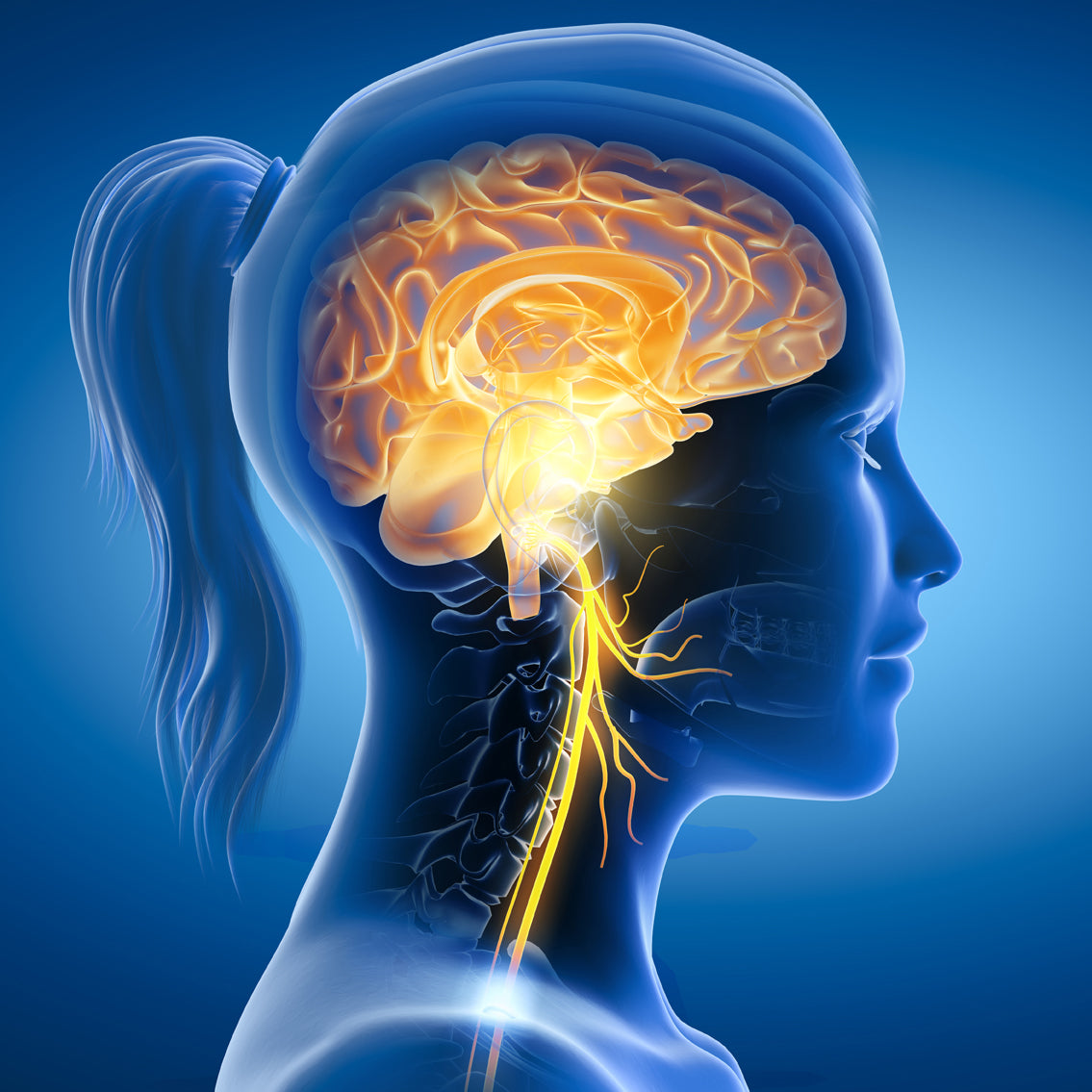
The Vagus Nerve and the ECS
WRITTEN BY MELANIE FLORES AND DR. SWATHI
While the winter season can be a joyous time of reunion it can also be a hectic time that can bring up feelings of stress and anxiety. Between event planning, financial burdens, visiting family, and cooking large meals it is normal that one would be feeling some extra stress during this time. Stress can be detrimental for one’s physical and mental health, so it is important to find ways to help manage your stress load. To do this it helps to understand exactly how stress manifests in the human body and how to naturally combat it. The vagus nerve is the longest nerve in your body and learning how to stimulate it can help you decrease feelings of stress and anxiety. There are natural ways to stimulate the vagus nerve and exciting research linking this stress controller to the internal endocannabinoid system (ECS).
What is the fight or flight response?
When your body is experiencing high amounts of stress hormones like cortisol and adrenaline are released and this activates the “fight or flight response.” Many of us have heard of this response that is controlled by the activating sympathetic nervous system. The flight or response is due to the beginning of humankind when stress would be caused by an actual threat in the wild, such as a bear. This response would keep us alive by helping us either fight back to the threat or run away from the predator. In our current world, this response can be triggered by things that are not actual safety threats such as planning a big holiday dinner or meeting your partner’s parents for the first time. If the body remains in a constant state of stress it can lead to inflammation, chronic illness, and mood swings.
What is the vagus nerve?
The vagus nerve is a cranial nerve that helps connect the brain to the rest of the body. The vagus nerve also counteracts the fight or flight system and triggers a relaxation response through the parasympathetic nervous system (PNS). The PNS is also the “rest and digest” response. The brain and the gut communicate bidirectionally via the vagus nerve. When the PNS is stimulated our bodies can begin to digest food, reduce heart rate, and reduce blood pressure. Thus, stimulating the vagus nerve can help one find a way to relax and have a lowered physiological stress response. Learning to increase the tone of your vagus nerve can naturally lower your anxiety and be extremely beneficial to your mental health, as having a higher vagal tone translates into your body being able to relax more quickly after stress.
Ways to Increase tone of the vagus nerve:
- Slow and deep belly breathing
- Foot massage
- Cold water face immersion
- Increased fiber intake
- Increased Omega-3 fatty acid intake
- Laughter
- Exercise
- Daily prebiotic / probiotic
The vagus nerve and the ECS
The ECS is an innate system in the human body made up of cannabinoid receptors that regulate body homeostasis and a variety of organ functions. The human body naturally creates molecules that can bind to cannabinoid receptors, but exogenous cannabinoid molecules we ingest from the cannabis plant can also activate the ECS. Research has provided evidence that cannabinoid receptors play a key role in influencing the activity of the vagus nerve’s communication with the brain. The ECS has receptors that are present in the human gut and have been shown to affect brain function directly through the vagus nerve. Recent research has shown that cannabinoid receptors can modulate the activity of vagus nerve transmission. The ECS in the gut also regulates inflammation and gut motility. The therapeutic effects of vagus nerve stimulation were shown to result after the administration of CBD. A study completed in rats also showed that blocking cannabinoid receptor 1 (CB1) inhibits a process usually completed by the vagus nerve, fat intake. The endocannabinoid system likely communicates with the vagus nerve to regulate fat intake. Another study completed in mice revealed that mice that lacked cannabinoid receptors had a suppressed appetite when they ingested fatty substances. These results suggest a definite link between innate cannabinoid receptors and the vagus nerve. Chronic cannabis use has also been shown to lead to symptoms indicative of increased vagal tone in humans such as reduced BMI and improved cardiovascular outcomes. Further evidence for exactly how cannabidiol directly affects the vagus nerve on a cellular level comes from a 2020 study completed in mice that utilized electrophysiology. Researchers from this study concluded that the ion channel TRPA1 mediates the excitatory effects of cannabinoids on the vagus nerve.
The bottom line
Increased stress is a common reaction to everything going on at this time of year, but we do not have to let our stress manifest itself that can decrease our self-worth or well-being. With the knowledge of vagal nerve stimulation, we can perform techniques such as deep belly breathing to decrease feelings of extreme stress. Research has shown that there is a definite connection between the innate human endocannabinoid system and the vagus nerve, but more research is needed before cannabinoids can be recommended for vagal nerve stimulation. This evidence would lead to breakthrough influences on the addition of cannabis products to a stress relief regimen.
References
- The vagus nerve: your secret weapon in fighting stress. AlliedServices. 23 June 2020. 2020. Accessed 1 December 2022. https://allied-services.org/news/2020/june/the-vagus-nerve-your-secret-weapon-in-fighting-s/.
- DiPatrizio NV, Astarita G, Schwartz G, Li X, Piomelli D. Endocannabinoid signal in the gut controls dietary fat intake. Proc Natl Acad Sci USA. 2011 Aug 2;108(31):12904-8. doi: 10.1073/pnas.1104675108. PMID: 21730161; PMCID: PMC3150876.
- Yoshida K, Kita Y, Tokuoka SM, Hamano F, Yamazaki M, Sakimura K, Kano M, Shimizu T. Monoacylglycerol lipase deficiency affects diet-induced obesity, fat absorption, and feeding behavior in CB1 cannabinoid receptor-deficient mice. FASEB J. 2019 Feb;33(2):2484-2497. doi: 10.1096/fj.201801203R. PMID: 30265576.
- Kowalski CW, Ragozzino FJ, Lindberg JEM, Peterson B, Lugo JM, McLaughlin RJ, Peters JH. Cannabidiol activation of vagal afferent neurons requires TRPA1. J Neurophysiol. 2020 Nov 1;124(5):1388-1398. doi: 10.1152/jn.00128.2020. PMID: 32965166; PMCID: PMC8356782.
–
This article was edited by Dr. Swathi and was written by Element Apothec Scientific Communications Intern, Melanie Flores. She is a Doctor of Pharmacy (PharmD) student at Oregon State University and Oregon Health & Science University College of Pharmacy in Portland, Oregon.











